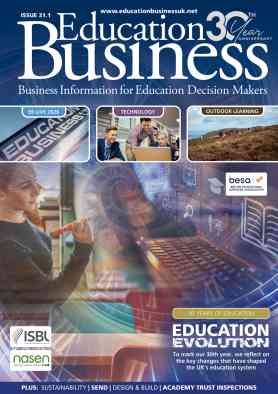
Digital skills for learning, life and work
The Digital Schools Awards programme for secondary schools in Scotland aims to create the next generation of informed, responsible and resilient digital citizens by providing schools with a roadmap for planning and teaching ‘with’ and ‘about’ digital technology
For some time now, digital skills champions, digital industry advocates and policy initiatives have recognised that it is no longer sustainable for schools to continue with the traditional use of digital technologies.
Digital skills are now essential for accessing products and services and there are increasing demands from employers for education to provide an innovative, technologically advanced flexible workforce.
Schools now can respond by creating environments in which learners can develop a range of general and specialist digital skills that are vital for learning, life and work in an increasingly digitised world. Unlocking the digital potential of all our young people will benefit individuals, the economy and society.
Preparing for the digital world
We must prepare young people for a digital world in which they can make safe, secure and informed choices that capitalise on new opportunities and allow them to play a full part in making Scotland a digital nation.
Schools are vital in providing the right knowledge and developing the right expertise to make this happen. Education leaders have a unique role in ensuring that Curriculum for Excellence is supported by a good school infrastructure and highly skilled teachers who can foster innovative practice in the use of digital technology for learning and teaching.
A key priority in shaping the Scottish Government’s Digital Learning and Teaching Strategy has been to align the needs of employers with the curriculum. Greater employer participation in school-based initiatives will help young people develop innovative and collaborative attitudes and behaviours that will allow them to thrive in the modern workplace and in society. Employers can share their unique knowledge and experiences to help teachers enrich their learners’ classroom activities and build high-quality, industry-ready skills.
Digital Schools Awards programme
In September 2017, the Digital Schools Awards programme for secondary schools launched in Scotland. The programme aims to create the next generation of informed, responsible and resilient digital citizens by providing schools with a roadmap for planning and teaching ‘with’ and ‘about’ digital technology.
A quarter of all Scottish secondary schools have now signed up to take part in the initiative which plans to support over a third of all E
secondary schools by the end of this year.
A strength of the programme is its unique collaboration between government, education and the technology industry led by HP, Microsoft and Intel. This collaboration is helping identify industry and economic trends that impact on the role of education to promote the digital society.
The programme’s industry-informed framework is designed to help teachers adopt best-practice models of digital pedagogy and to exploit the power of digital technologies to enhance learning and develop higher levels of digital skills.
Participating schools self-assess their digital technology deployment under five headings, namely, Leadership and Vision, Digital Technology for Learning and Teaching, School Culture, Professional Development and Resources and Infrastructure. The programme supports Scottish schools’ strong culture of self-evaluation by building on the aims and processes of ‘How Good Is Our School?’ (HGIOS4).
Successful schools receive a nationally recognised Digital Schools Award accredited by Education Scotland, as well as practical support and resources as part of a growing community of digital schools.
These features are embedded within the self-assessment framework that harnesses emerging technologies in disciplines such as the arts, humanities, programming, design, GIS, data-logging etc. Such infusion of digital technology will enable young people to fulfil the aims of “Curriculum for Excellence” in a 21st Century context.
Creating the digital society
Similarly, extending the skills and confidence of teachers and empowering leaders to drive innovation will mean that schools are well placed to play a central role in creating the digital society.
The secondary school programme builds on the successful introduction of the Digital Schools Awards to Scottish primary schools in 2016 which has already seen more than 500 schools register and 54 schools achieve digital school accreditation.
During its development, the Digital Schools Award has had inputs from organisations such as Developing the Young Workforce, PLAN C, Scotland IS, Smarter Grid Solutions, STEM, the Child Protection Team for Educating Scotland and the Skills Investment Plan.
Together, this partnership has garnered the latest thinking in digital technology for education such as, digital innovation and creativity; computational thinking; advances in STEM; the use of digital technology to promote higher order thinking skills; support for gender equity, and equality of access.
The multi-agency approach means that the Digital Schools Award is well placed to support schools in implementing the Digital Learning and Teaching Strategy for Scotland (and indeed, the digital learning and teaching strategies of other jurisdictions).
It is also a key player in helping the Skills Investment Plan achieve its goals and to help busy teachers focus on the most effective ways to invest time and effort in developing expertise in the pedagogy of digital learning.
The programme is aligned with internationally recognised digital technology standards such as the UNESCO ICT Teacher Competency Framework; the Florida Technology Integration Matrix and Microsoft’s 21st Century Skills Framework.
Skills Development Scotland and ScotlandIS have placed a high priority on reviewing future skills and employment demands to help Scotland respond to and embrace the skills challenges that exist in a dynamic and rapidly evolving digital world.
Now, more than ever, it is imperative that stakeholders, education providers, public bodies and employers work together to ensure that skills investment is targeted effectively and provides Scotland’s young people with the maximum potential to flourish.
Further Information:Latest News
03/03/2026 - 09:57
The Scottish Government is rolling out a National Primary School Swimming Framework, a universal offer to primary aged children to learn to swim alongside learning vital water safety skills.
03/03/2026 - 09:37
Senior HM Inspector Adam Sproston will discuss the inspectorate’s approach to SEND and inclusion at Education Business LIVE in March.
02/03/2026 - 10:07
Children’s charity Youth Sport Trust has awarded the first Well School accreditations, recognising schools that are prioritising pupil and staff wellbeing alongside academic performance as a measure of success.
02/03/2026 - 09:39
The government has launched a major new consultation to gain views on how to keep children safe online across social media, AI chatbots and gaming platforms.
27/02/2026 - 14:12
LGfL-The National Grid for Learning has launched a free Artificial Intelligence (AI) Policy Toolkit to help schools across the UK develop clear approaches to AI that put safeguarding at the forefront.







